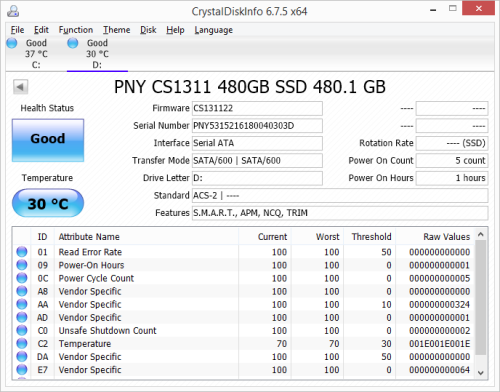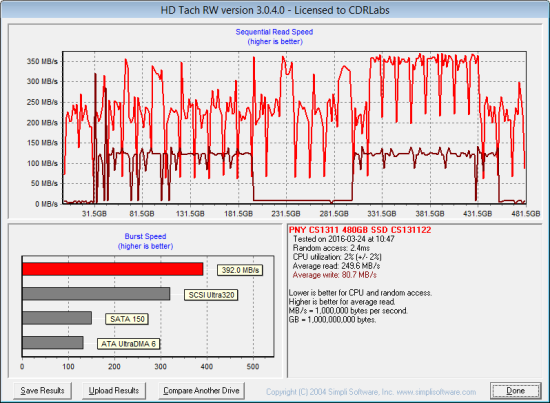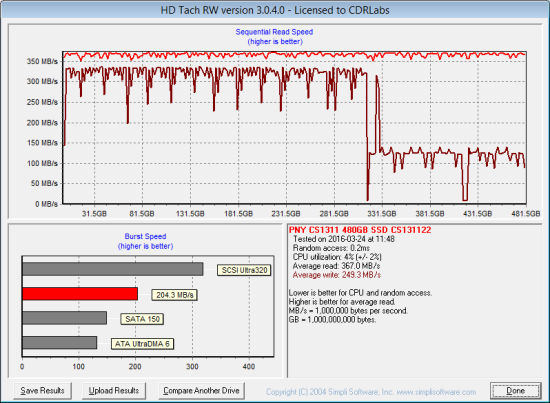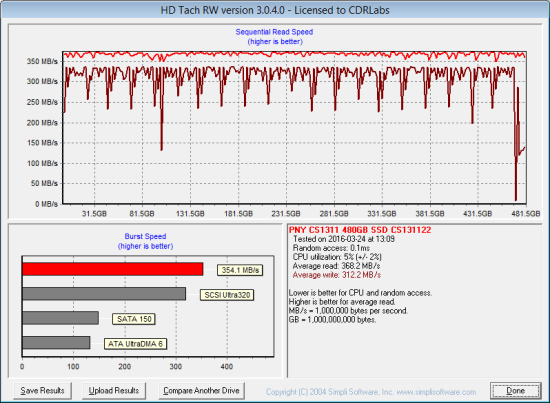TRIM Performance:
While SSD's offer many benefits, there are some downsides to using flash memory. One of the biggest issues people run into is performance degradation. Over time, an SSD will run out of fresh blocks and will have to write over data the file system has marked as deleted. This procedure is very complicated and can slow an SSD's write speeds considerably.
To fix this problem, most manufacturers have added TRIM support to their SSDs. The TRIM command allows an operating system, such as Windows 7, to tell an SSD which data blocks are no longer in use. Using this information, the drive pro-actively erases these blocks and adds them to the free block pool.

To test the CS1311's TRIM and garbage collection functions, I first put the drive in a "dirty" state. I used Iometer to fill the entire drive and then ran a random write test for 30 minutes. Looking at the screenshot below, you can see that the CS1311's average read and write speeds dropped to 249.6 MB/s and 80.7 MB/s, respectively.

PNY CS1311 - Dirty
To see how well the CS1311 could recover, I let the computer sit for about an hour and then reran the test. The drive's average read speed climbed up to 367.0 MB/s. However, its read speed lagged behind, averaging out at 249.3 MB/s.

PNY CS1311 - After TRIM
Lastly, I used Parted Magic to perform a secure erase on the CS1311. With the drive wiped clean, it had average read and write speeds of 368.2 MB/s and 312.2 MB/s, respectively.

PNY CS1311 - Secure Erased
Final Thoughts:
While not the fastest or most feature packed SSD to come through the 'Labs, the PNY CS1311 delivers a lot of bang for your buck. Powered by the same quad-core, eight-channel Phison PS3110-S10 controller as the CS2211, the CS1311 uses Toshiba's 15nm TLC NAND to provide an easy and affordable way for consumers to improve the performance of their laptop or desktop computer. In our sequential read and write tests, the 480GB version of the CS1311 was able to read at speeds as high as 567 MB/s and write at speeds in excess of 535 MB/s. It also had no problems holding its own when doing random reads, but lagged behind other drives in our random write tests, producing a little more than 39,000 IOPS at low queue depths.
Like most TLC-based SSDs, the CS1311 does have its limitations. To compensate for the slow write speeds typically associated with this type of NAND, the drive employs a form of SLC caching. Using this cache, the CS1311 is able to maintain peak performance under normal workloads. However, once a consecutive write operation exceeds the size of the cache and you make the transition to TLC NAND, its write speed drops considerably. It's unlikely that you will ever run into this situation if your computer is used primarily for web browsing or word processing, but, if you have heavier workloads, you may want to consider PNY's CS2211 SSD.
The CS1311 is available now in 120GB, 240GB, 480GB and 960GB capacities. Prices on Amazon.com and PNY.com currently range from $40 up to $240, with the 480GB version reviewed here retailing for about $120.
Highs:
- Available in 120GB, 240GB, 480GB and 960GB capacities
- Phison PS3110-S10 controller
- Good sequential read and write speeds under most conditions
- Performs equally well with compressible and incompressible data
- SATA 6Gb/s interface
- Good looking and well constructed design
- Includes 9.5mm adapter and Acronis data migration software
- Reasonably priced
- 3 year warranty
Lows:
- Mediocre random write performance
- Write speed drops when SLC cache is full
- Does not support hardware based encryption
- Does not support DEVSLP

